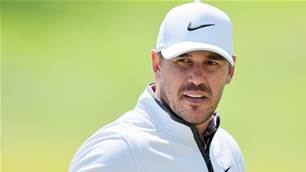The slow play debate, well it's not so much a debate but a rare universal golf agreeance, reared its head again last week when Brooks Koepka passed comment on the glacial pace of the Masters final round.
Koepka and playing partner, and eventual Masters winner, Jon Rahm were shown standing in wait for the group ahead. The most noticeable occurrence when standing on the par-3 16th tee.
A known fast player and regular commenter on slow play, Koepka was asked about the Sunday speed of play post round and set his sights on the group ahead featuring Viktor Hovland and Patrick Cantlay. The latter coming in for plenty of public criticism since.
“The group in front of us was brutally slow. Jon went to the bathroom like seven times during the round, and we were still waiting,” Koepka said.
Since that round and those comments, social media has been inundated with discussion on the issue and particularly Cantlay’s pace of play.
Teeing it up this week at the RBC Heritage, Cantlay was asked to respond.
“I mean, we finished the 1st hole, and the group in front of us was on the 2nd tee when we walked up to the 2nd tee, and we waited all day on pretty much every shot. We waited in 15 fairway, we waited in 18 fairway. I imagine it was slow for everyone,” Cantlay said.
Adding later in his press conference: “One thing that's interesting sitting on the PAC is you get all the numbers and the data, and rounds have taken about the same length of time for the last 10 or 20 years that they currently take.
“When you play a golf course like Augusta National where all the hole locations are on lots of slope and the greens are really fast, it's just going to take longer and longer to hole out.

“I think that may have been what attributed to some of the slow play on Sunday, and then also when the wind is gusting and the wind is blowing maybe inconsistently, that's when guys will take a long time, too. I think that's just the nature of playing professional golf, where every shot matters so much.”
That Cantlay didn’t immediately own up to being one of Tour’s snails is hardly surprising. Nor is the fact that he referenced the conditions and the value of every shot for a player whose living depends on the result, or any plan to address his own speed of play.
And therein lies part of the problem addressing the slow play issue.
Players know the rules on pace of play, but they also know that slow play penalties are so rarely doled out they can go about their business how they like. They are also more than aware that if they are slow, there is at least a couple of other slow players in the field that they can point to as creating the issue throughout the rest of the field.
Fast players like Koepka are the ones who suffer, so too we the fans who have to watch more dead air golf than we would like.
Koepka won’t blame his performance in the final round as getting iced by slow play, and many fast players before him have had to learn ways to deal with the slow-moving ways of Tour golf.
"Players know the rules on pace of play, but they also know that slow play penalties are so rarely doled out they can go about their business how they like." - Jimmy Emanuel.
However, those players willing to get on with it shouldn’t be at a disadvantage and his complaints won’t speed up Cantlay and co. The only thing that will is being penalised on the scorecard, because in the modern professional game awash with eye watering sums of money there is no realistic way of hitting players in the hip pocket hard enough for them to notice.
Cantlay’s arguments about conditions and the difficulty of Augusta National are fair, but it is the same for the entire field on Sunday, so if you all have the same time to assess then hit your shot, that shot still matters and you still have as much control of the outcome as the rest of the field.
The targeting of Patrick Cantlay is perhaps unfair given he is but one of many players with a lack of purpose when it comes to pace of play at times. Yet what it does highlight is the need for action, and that has to come from tournament organisers with a genuine interest in speeding up play and making tournament golf more watchable.
Every shot matters so much, shouldn’t equate to so much time.
Related Articles

Morri: In praise of Jon Rahm

Koepka not dwelling on his Masters 'choke'













